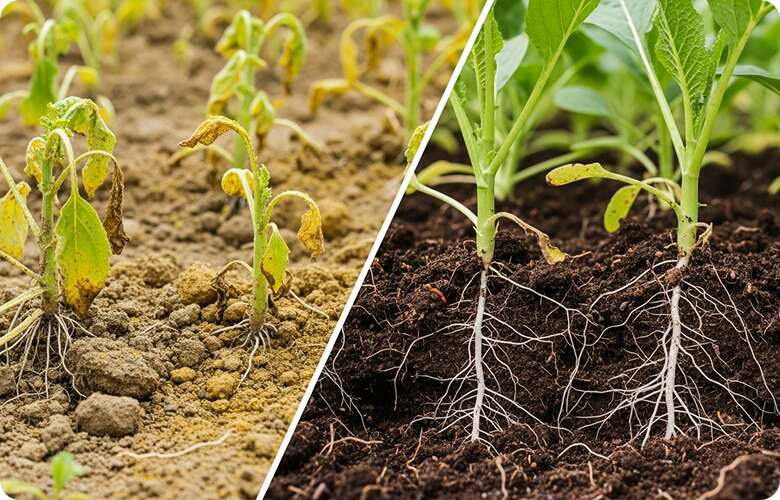
Learn how biofertilizers improve soil health, increase crop yields, and reduce chemical use from this farmer’s guide to natural and sustainable farming.
Modern farming has two big challenges: increasing crop yields with environment protection. For years, farmers have depended on chemical fertilizers, but overuse has led to soil degradation, water pollution, and reduced biodiversity. This is where biofertilizers are put to use, the natural choice for sustainable agriculture. By using beneficial microorganisms, biofertilizers not only nourish plants but also restore soil health for long-term productivity.

Biofertilizers are natural fertilizers made from living microorganisms called microbes. When they are added to the soil or the crops, they improve nutrition by fixing the atmospheric nitrogen, dissolving in phosphorus and speeding up plant growth. Unlike chemical fertilizers, biofertilizers improve soil fertility over time instead of letting it fade.
Biofertilizers help in the growth of beneficial microorganisms that naturally improve the soil. Unlike synthetic or chemical fertilizers, which damage the soil over time, biofertilizers improve soil structure, fertility, and productivity.
Nitrogen-fixing bacteria in biofertilizers convert atmospheric nitrogen into a form plants can absorb. Similarly, microorganisms that dissolve phosphate make essential phosphorus available to plants. This reduces the need for expensive synthetic fertilizers.
By increasing natural nutrient cycles, biofertilizers reduce reliance on chemical fertilizers and pesticides. This not only prevents water pollution but also helps save biodiversity.
Biofertilizers increase root growth, enhance nutrient absorption, and build plant resistance against diseases. Farmers can get higher yields and better-quality produce without the chemical damage to the environment.
Biofertilizers are often cheaper than chemical fertilizers and reduce input costs for farmers. They also reduce greenhouse gas emissions, making farming more environment friendly.
Biofertilizers can be applied across a wide range of crops:
Healthy soils enriched with biofertilizers are more tolerant to drought, floods, and other extreme climates. They help farmers adapt to climate change while promoting sustainable farming practices.
Biofertilizers as the Future of Sustainable Agriculture
The future of agriculture lies in sustainability, and biofertilizers are the natural choice for farmers who want to protect their soil, reduce costs, and grow healthier crops. By enhancing soil health, improving nutrient efficiency, and supporting climate tolerance, biofertilizers ensure that farming is productive not just for today but for the coming generations too.
